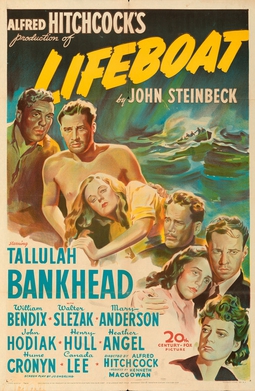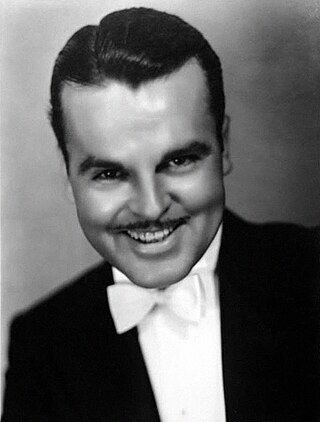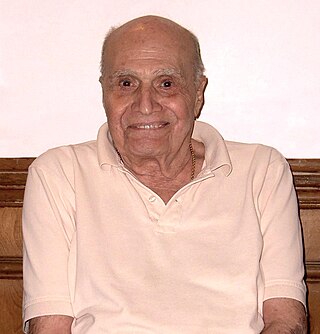Related Research Articles

Lifeboat is a 1944 American survival film directed by Alfred Hitchcock from a story by John Steinbeck. It stars Tallulah Bankhead and William Bendix, alongside Walter Slezak, Mary Anderson, John Hodiak, Henry Hull, Heather Angel, Hume Cronyn and Canada Lee. The film is set entirely on a lifeboat launched from a freighter torpedoed and sunk by a Nazi U-boat.

Nelson Alexander Ross is an American comic book writer and artist known primarily for his painted interiors, covers, and design work. He first became known with the 1994 miniseries Marvels, on which he collaborated with writer Kurt Busiek for Marvel Comics. He has since done a variety of projects for both Marvel and DC Comics, such as the 1996 miniseries Kingdom Come, which he also cowrote. Since then he has done covers and character designs for Busiek's series Astro City, and various projects for Dynamite Entertainment. His feature film work includes concept and narrative art for Spider-Man (2002) and Spider-Man 2 (2004), and DVD packaging art for the M. Night Shyamalan film Unbreakable (2000). He has done covers for TV Guide, promotional artwork for the Academy Awards, posters and packaging design for video games, and his renditions of superheroes have been merchandised as action figures.

M*A*S*H is an American media franchise consisting of a series of novels, a film, several television series, plays, and other properties, and based on the semi-autobiographical fiction of Richard Hooker.

The Leopard's Spots: A Romance of the White Man's Burden—1865–1900 is the first novel of Thomas Dixon's Reconstruction trilogy, and was followed by The Clansman: A Historical Romance of the Ku Klux Klan (1905), and The Traitor: A Story of the Fall of the Invisible Empire (1907). In the novel, published in 1902, Dixon offers an account of Reconstruction in which he portrays a Reconstruction leader, Northern carpetbaggers, and emancipated slaves as the villains; Ku Klux Klan members are anti-heroes. While the playbills and program for The Birth of a Nation claimed The Leopard's Spots as a source in addition to The Clansman, recent scholars do not accept this.

James Neil Hamilton was an American stage, film and television actor, best remembered for his role as Commissioner Gordon on the Batman TV series of the 1960s, having first played a character by that name in 1928's Three Week-Ends. During his motion picture career, which spanned more than a half century, Hamilton performed in over 260 productions in the silent and sound eras.

Carmine Infantino was an American comics artist and editor, primarily for DC Comics, during the late 1950s and early 1960s period known as the Silver Age of Comic Books. Among his character creations are the Black Canary and the Silver Age version of the Flash with writer Robert Kanigher, Elongated Man with John Broome, the Barbara Gordon incarnation of Batgirl with writer Gardner Fox, Deadman with writer Arnold Drake, and Christopher Chance, the second iteration of the Human Target, with Len Wein.
Andrew Victor McLaglen was a British-born American film and television director, known for Westerns and adventure films, often starring John Wayne or James Stewart.

The Good Shepherd is a 2006 American spy film produced and directed by Robert De Niro and starring Matt Damon, Angelina Jolie, and De Niro, with an extensive supporting cast. Although it is fictional, loosely based on events in the life of James Jesus Angleton, it is advertised as telling the history of the birth of counterintelligence in the Central Intelligence Agency (CIA).

John Fox Jr. was an American journalist, novelist, and short story writer. His home in Big Stone Gap, Virginia is a museum and listed on the National Register of Historic Places. Several of his works were bestsellers and were adapted to films. He married an opera star. He was inducted into the Kentucky Writers Hall of Fame.
Alfred Edgar Frederick Higgs, who wrote under the name Barré Lyndon, was a British playwright and screenwriter.
Kingdom Come State Park is a part of Kentucky's state park system in Harlan County atop Pine Mountain near the city of Cumberland. It was named after the 1903 best-selling novel The Little Shepherd of Kingdom Come by native Kentuckian John Fox, Jr. Features of the park include Raven Rock, Log Rock, and a 3.5-acre (1.4 ha) mountain lake. The section of the park is also a legally dedicated state nature preserve by the Office of Kentucky Nature Preserves.

This is a list of bestselling novels in the United States in the 1900s, as determined by The Bookman, a New York–based literary journal. The list features the most popular novels of each year from 1900 through 1909.

White Dog, released in France as Chien Blanc, is a non-fiction autobiographical novel written by Romain Gary. Originally published as a short story in Life in 1970, the full novel was published in 1970 in French in France by Éditions Gallimard. Gary's English version of the novel was published in North America in the same year by New American Library. The novel provides a fictionalized account of Gary and his wife's experiences in the 1960s with a stray Alabama police dog trained to attack black people on sight, and their attempts to have the dog reprogrammed.

The Chapman Report is a 1962 American Technicolor drama film starring Shelley Winters, Jane Fonda, Claire Bloom and Glynis Johns. It was made by DFZ Productions and distributed by Warner Bros. It was directed by George Cukor and produced by Darryl F. Zanuck and Richard D. Zanuck, from a screenplay by Wyatt Cooper and Don Mankiewicz, adapted by Gene Allen and Grant Stuart from Irving Wallace's 1960 novel The Chapman Report. The original music was by Leonard Rosenman, Frank Perkins and Max Steiner, the cinematography by Harold Lipstein, the color coordination images and main title design by George Hoyningen-Huene, and the costume design by Orry-Kelly.

In US cinema, Blaxploitation is the film subgenre of action movie derived from the exploitation film genre in the early 1970s, consequent to the combined cultural momentum of the Black civil rights movement, the black power movement, and the Black Panther Party, political and sociological circumstances that facilitated Black artists reclaiming their power of the Representation of the Black ethnic identity in the arts. The term blaxploitation is a portmanteau of the words Black and exploitation, coined by Junius Griffin, president of the Beverly Hills–Hollywood branch of the NAACP in 1972. In criticizing the Hollywood portrayal of the multiracial society of the US, Griffin said that the blaxploitation genre was "proliferating offenses" to and against the Black community, by perpetuating racist stereotypes of inherent criminality.

Planet of the Apes is a science fiction media franchise consisting of films, books, television series, comics, and other media about a post-apocalyptic world in which humans and intelligent apes clash for control as the dominant species. The franchise started with French author Pierre Boulle's 1963 novel La Planète des singes, translated into English as Planet of the Apes or Monkey Planet. Its 1968 film adaptation, Planet of the Apes, was a critical and commercial hit, initiating a series of sequels, tie-ins, and derivative works. Arthur P. Jacobs produced the first five Apes films through APJAC Productions for distributor 20th Century Fox; following his death in 1973, Fox controlled the franchise, before its acquisition by Disney in 2019.

The Little Shepherd of Kingdom Come is an American CinemaScope Western film directed by Andrew V. McLaglen. It stars Jimmie Rodgers and Luana Patten and includes the film debut of George Kennedy.
The history of the 1954 to 1968 American civil rights movement has been depicted and documented in film, song, theater, television, and the visual arts. These presentations add to and maintain cultural awareness and understanding of the goals, tactics, and accomplishments of the people who organized and participated in this nonviolent movement.
Kentucky literature did not become well known until the late 19th century, when authors such as James Lane Allen, John Fox, Jr., Alice Hegan Rice, and Annie Fellows Johnston brought light to the state's rich history and culture. As their literary works grew in popularity around the country and world, others began to take notice of all types of Kentucky literature, including works of fiction, nonfiction, poetry and the historical novel.
The Little Shepherd of Kingdom Come may refer to:
References
- ↑ Bill York John Fox, Jr., Appalachian Author 2010 p171b Early in 1898, he had written Tom Page that he had worked his first hour on a Civil War novel. It would be a year before he would write another line after that first chapter of The Little Shepherd of Kingdom Come was finished, ..."
- ↑ Now and Then - Volumes 1-4 -1984 · Page 45 "In the 1960s, The Little Shepherd of Kingdom Come was in disfavor because of Fox's depiction of black characters such as Snowball "